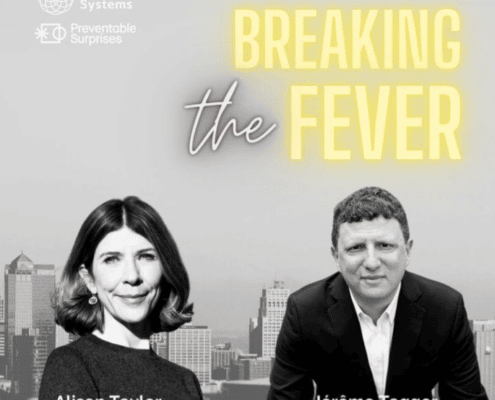Tag Archive for: Whistleblowing

Breaking the Fever: A Conversation with Wall Street Veteran and Whistleblower Desiree Fixler
Blog, Internal Reporting, Personality & Personnel, Podcast
Has Twitter Been Ignoring Cybersecurity Failings?
Blog, Corporate Culture, Internal Reporting
Why It Seems Like So Many Big Tech Whistleblowers Are Women
Blog, Corporate Culture, Corruption, Decision Making, Internal Reporting, Speak-Up and Call-Out Culture
Why Do People Become Whistleblowers?
Blog, Internal Reporting
Whistleblower: Companies Need to Encourage Speak-Up Culture
Blog Maria Lemos Stein recently interviewed noted consultant Wendy Addison, Founder and Chief Executive of SpeakUp SpeakOut, in The Wall Street Journal. Addison is also known for her personal role as a whistleblower on fraud and corruption in 2000 regarding LeisureNet Ltd., whose joint chief executives were convicted of fraud in one of the biggest corporate scandals in South Africa
Maria Lemos Stein recently interviewed noted consultant Wendy Addison, Founder and Chief Executive of SpeakUp SpeakOut, in The Wall Street Journal. Addison is also known for her personal role as a whistleblower on fraud and corruption in 2000 regarding LeisureNet Ltd., whose joint chief executives were convicted of fraud in one of the biggest corporate scandals in South Africa
Addison promotes a speak up culture as the method by which companies develop an environment where problems are acknowledged and solved transparently, and before a problem becomes widespread. That way, she asserts, companies avoid the fines, reputation loss, and other negatives associated with more public scandal. Further, the person or group reporting the issue does not face internal retribution because speaking up is encouraged at all levels of the organization.

Ethical Systems Files Amicus Brief in Defense of Internal Whistleblowers
BlogThis post originally appeared on The FCPA Blog. It is cross posted here.
 On November 28, 2017, the Supreme Court will hear arguments in Digital Realty Trust v. Paul Somers on the question of whether the whistleblower protections of the Dodd-Frank Act extend to internal whistleblowers, or only to those who report to the SEC.
On November 28, 2017, the Supreme Court will hear arguments in Digital Realty Trust v. Paul Somers on the question of whether the whistleblower protections of the Dodd-Frank Act extend to internal whistleblowers, or only to those who report to the SEC.
 Research shows that the majority of employees who report misconduct do so internally, through informal discussions with managers and other conduits. If the Court interprets the Act’s protections as extending only to those who provide information to the SEC, it could stymie and complicate the important work of ethics & compliance ers.
Research shows that the majority of employees who report misconduct do so internally, through informal discussions with managers and other conduits. If the Court interprets the Act’s protections as extending only to those who provide information to the SEC, it could stymie and complicate the important work of ethics & compliance ers.

Featured Ethics Scholar for December: Dennis Gentilin
BlogInterview with Dennis Gentilin, Whistleblower, Author and Consultant on Corporate Citizenship
 What are your main areas of research/work?
What are your main areas of research/work?
Let me begin by stating that I don’t see myself as a scholar (at least not formally). However I do see enormous value in using the findings and tools from the social and behavioral sciences to help address the ethical challenges facing the business world. This is one of the many reasons I am a big advocate of Ethical Systems.
As one would expect given my experience and background (outlined below), my primary area of interest is employee voice and speak up cultures. What my experience showed me is that even the best “formal systems” (rules, regulations, compliance and other such artifacts) have shortcomings. The best (and arguably the only) way to overcome these is to nurture the “human systems” within organizations. A speak up culture is a core component of this latter system.

Bro-ken speech? Speaking up and speaking out
Blog Speaking-up is hard to do. In a research survey conducted by Sean Martin, Associate Professor at the Carroll School of Management, and presented at Ethics By Design, respondents identified speaking up about ethical issues as the scariest form of “employee voice” in organizations (even more so than speaking up to point out problems). If you’ve ever felt that pain in your gut about giving bad news to your boss, you likely share this sentiment.
Speaking-up is hard to do. In a research survey conducted by Sean Martin, Associate Professor at the Carroll School of Management, and presented at Ethics By Design, respondents identified speaking up about ethical issues as the scariest form of “employee voice” in organizations (even more so than speaking up to point out problems). If you’ve ever felt that pain in your gut about giving bad news to your boss, you likely share this sentiment.
Raising ethical issues requires courage compared to other forms of workplace interactions, as shown in research by James Detert – people’s self-preservation instincts drive their decision to stay silent, even if it’s an issue the company could perceive as one that improves its processes, products or procedures. Research by Professors Milliken (NYU Stern), Morrison and Hewlin (NYU Stern) also shows that employees are likely to be silent because they fear being labeled a troublemaker by their colleagues, and thus damaging valued business relationships. Surprisingly, retaliation in the form of losing one’s job or being passed up for a promotion is at the bottom of the list of reasons to stay silent.
Given this fear, it’s no surprise that corporations struggle to change their internal culture, particularly when the issues are cultural transgressions that subtly create imbalances in the workplace.

Should Whistleblowers Receive a Reward for Speaking Up?
Blog The increased exposure recently provided to the actions of whistleblowers at organisations like CommInsure, Theiss and 7-Eleven is, in a perverse way, a very positive development. Obviously we feel for those who under extremely difficult circumstances have taken considerable personal risk to expose wrongdoing, especially if their selfless actions have come at a cost. This latter outcome can never be excused. However, the increased publicity is proving to be a catalyst for change.
The increased exposure recently provided to the actions of whistleblowers at organisations like CommInsure, Theiss and 7-Eleven is, in a perverse way, a very positive development. Obviously we feel for those who under extremely difficult circumstances have taken considerable personal risk to expose wrongdoing, especially if their selfless actions have come at a cost. This latter outcome can never be excused. However, the increased publicity is proving to be a catalyst for change.
And there is no question that change is needed. At the organisational level companies must begin to recognise that there are enormous benefits associated with giving employees voice. Even the best laid compliance framework has limitations, and the most effective way to overcome these is to promote and embrace a speak up culture – employees shining a torch on poor conduct should be cherished not chastised.

Internal Reporting: Praising leaders for identifying issues
Blog Internal reporting is one of the quickest ways employees can alert relevant organizational- and governmental- contacts that something is amiss. While extensive research shows that a major impediment to doing so is fear of retaliation, new research from ES collaborator David Mayer and others demonstrates that for organizational leadership, speaking up is an asset while keeping quiet about ethical lapses is viewed as detrimental.
Internal reporting is one of the quickest ways employees can alert relevant organizational- and governmental- contacts that something is amiss. While extensive research shows that a major impediment to doing so is fear of retaliation, new research from ES collaborator David Mayer and others demonstrates that for organizational leadership, speaking up is an asset while keeping quiet about ethical lapses is viewed as detrimental.
The study, “When are Do-Gooders Treated Badly? Legitimate Power, Role Expectations, and Reactions to Moral Objection in Organizations,” [PDF] to be published in the Journal of Applied Psychology, identifies important implications for both people and organizations.
